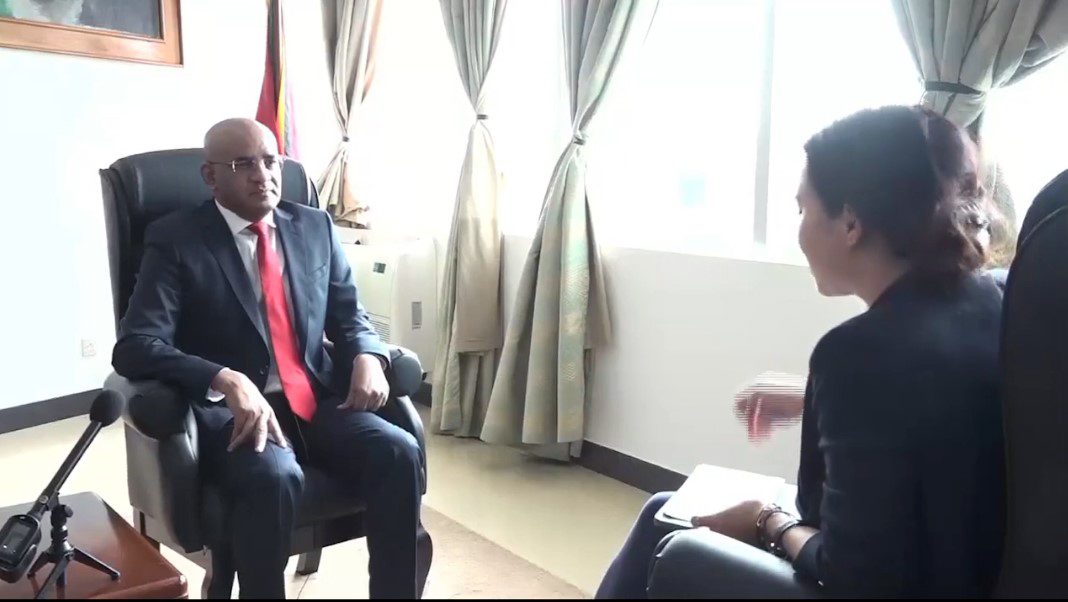A Vice News documentary episode, long anticipated by citizens of South America’s newest oil producing nation, Guyana, was finally released on Sunday, titled ‘Guyana for Sale’.
It was so anticipated because, in February, the country’s Vice President, Dr. Bharrat Jagdeo, released a complete recording of a 99-minute interview he provided to Vice correspondent, Isobel Yeung. Included in this recording were allegations of corruption leveled directly at him, and his own concern that foreign reporters come to the shores of developing countries like Guyana, seeking to portray their leaders as corrupt.
Then began the wait…
The 15-minute documentary includes recordings gathered by Yeung and a colleague while under cover in Guyana investigating what Yeung described as ‘business networks with links to China’. They show several Chinese men claiming Guyana’s leadership receives bribes in exchange for government support.
Yeung and her colleague, most notably took record of conversations with a Chinese businessman named Su Zhi Rong, while posing as investors. Su, who rents a house owned by the Guyanese Vice President, is heard in one clip saying he can help get things done because he is close with Dr. Jagdeo and other officials – but at a price.
No evidence of a bribe being handed over is shown in the video.
Yeung said Su laid out a wide range of attractive investment opportunities, including land in a prime location where a hotel and casino could be built. The Vice team, it is understood, feigned interest in this investment opportunity, to investigate the corruption claims.
In an attempted sting operation, Su escorted Yeung’s colleague identified only as ‘Mr. Chan’, to Dr. Jagdeo’s house. In a recording, Mr. Chan is heard asking Jagdeo, “Do you understand our deal?”
“No, no, no. I’m not getting involved with business.” Jagdeo responds. He explains that ‘Mr. Chan’ will get the support he needs, and that Su deals with all the agreements.
“My thing is that I am in government. So, I assist from the government’s side. That’s it.” Vice President Jagdeo said.
Not much else of the encounter is played.
‘Mr. Chan’ later tells Su that he needs to know ‘the money’ will go to Jagdeo. Su responds saying that he will facilitate this.
As they leave, Su is heard telling ‘Mr. Chan’ that he handled previous deals, such as one involving an “oil company” and that Dr. Jagdeo’s hands are clean.
Su had denied making these claims after the Vice President released the full interview in February.
Dr. Jagdeo said at the time that as a senior functionary in government, part of his job is to meet with investors, in keeping with the administration’s push to facilitate investments in the country.
Following the Vice News airing on Sunday, the Vice President said it is clear that Su used his friendship to leverage it and extort investors.
“I made it clear that I did not want to discuss the specifics of his projects; that my job was from the government side to facilitate projects for everyone,” Dr. Jagdeo said in a comment to online news service, Demerara Waves. He reiterated that government officials do not have to be paid to facilitate investments. “Our job is to do that on our own and so if they are ripping off these investors and collecting their money as a service fee or whatever else, they are keeping all of it to themselves,” he said.
Dr. Jagdeo told Yeung that when reporters come from abroad, they tend to want to portray leaders of developing countries as corrupt.
The Vice episode sought to portray China – America’s rival for international, geopolitical dominance – as being involved in underhand dealings in countries around the world.
Yeung explains that the US is threatened by China’s growing presence in South America. A clip is shown of US President, Joe Biden, speaking out against China’s supposed ambition.
“China has an overall goal to become the wealthiest country in the world and the most powerful country in the world,” Biden says. “That’s not going to happen on my watch.”
Since the discovery of oil in Guyana in 2015, the country has been attracting investors from around the world. The US Ambassador to Guyana and High Commissioners from Canada and the UK have all been actively facilitating investments from their home countries.
Just recently, British High Commissioner to Guyana, Jane Miller, said the Guyanese government is taking the right steps to avoid pitfalls of other oil producing nations.
“I am very pleased that Guyana joined EITI because transparency is key and EITI brings together the three major players on the extractive industry – the private sector, its government and civil society, and these are important to ensure that transparency holds together,” the High Commissioner said.
The International Monetary Fund also said in statement released on June 3 that Guyana is making progress in strengthening its anti-corruption framework.
“Audit reports of public expenditures, including for COVID, are published, and their recommendations are followed up on. Asset declarations of a large number of public officials are submitted annually, and public procurement tenders are streamed live,” the IMF said.



